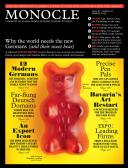
Issue 61
Why the world needs the new Germans (and their sweet bear): A Monocle special report on how Europe’s star economy uses business brawn, good design and Gummi Bears to win hearts, minds and tummies.
In This Issue
Oops! No content was found.
Looks like we no longer have content for the page you're on. Perhaps try a search?
Return Home

